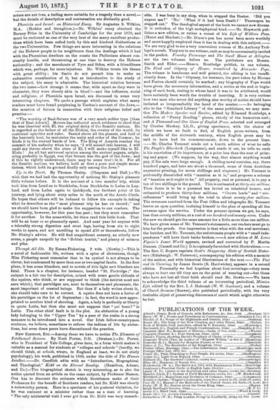New EDMON8, Era—Among these we have to notice The Elements
of Intellectual Science. By Noah Porter, D.D. (Strahan.)—Dr. Porter, who is President of Yale College, gives here, in a form which makes it suitable as a manual for students at "colleges and schools " (hardly, we should think, at schools, where, in England at least, we do not study psychology), his work, published in 1868, under the title of The Human Candlish edits with an "Introduction, Biographical, and Theological," Kidd on the Eternal Sonship. (Hamilton, Adams, and Co.)—The biographical sketch is very interesting, as is also the notice quoted from an article on the same subject, by Professor Masson. One has to discount the estimate which Scotchmen make of their Professors for the benefit of Southern readers, but Dr. Kidd was clearly a noteworthy person. Here is a specimen of his pastoral visitation, for he was eminent as a minister rather than as a man of learning. "The only ministerial visit I ever got from Dr. Kidd was very remark- ' able. I was busy in my shop, when in stepped the Doctor. 'Did you expect me?' No." What if it had been Death ? • Thereupon he stepped out." The theological aspect of the book we cannot now discuss It is orthodox, of the high metaphysical kind.—Mr. Hepworth pub- lishes a sew edition, or rather a recast of his Life of William Penn. (Hurst and Blackett.)—Mr. Dixon's pen has never been more worthily and more happily employed than it has in dealing with this subject.— We are very glad to see a very convenient reissue of Mr. Anthony Trol- lope's novels. They are in one volume, such as may be conveniently carried in the pocket. Framley Parsonage and The Small House at Allingtoa are the two volumes before us. The publishers are Messrs. Smith and Elder.—Messrs. Rontledge publish, in one volume, The Iliad and Odyssey of Homer, translated by Alexander Pope. The volume is handsome and well printed, the editing is but insuffi- ciently done. In the " Odyssey, for instance, the part taken by Blooms and Fenton should certainly be marked ; any biography of Pope would have given the necessary information, and a notice at the end or begin-
ning of each book, stating to whose hand it was to be attributed, would have certainly been worth the trouble of inserting. It is very curious
how two men who never did anything else worthy of notice should have imitated so irreproachably the hand of the master.—As belonging also to the "Standard Library" of the same publishers, we may men- tion The Modern Speaker and Reciter, edited by Edmund Routledge, a collection of "Penny Reading" pieces, chiefly of the humorous sort; and A Thousand-and-One Gems of English Prose, selected and arranged by Charles Mackay, LL.D., giving specimens, with tho choice of which we have no fault to find, of English prose-writers, from the middle of the sixteenth century, when English prose may hs said to have had its commencement, down to the present time. —Mr. Charles Tennant sends out a fourth edition of what he calls The People's Blue-book (Longmans), and sends it out, he tells us, such is his conviction of its importance, at a price less than the cost of print- ing and paper. (We suppose, by the way, that almost anything would pay, if'the sale were large enough. A shilling novel contains, say, three hundred pages, and here are about a thousand, some of them doubtless expensive printing, for seven shillings and sixpence.) Mr. Tennant is profoundly dissatisfied with taxation as it is," and proposes a scheme of "taxation as it ought to be." All property, real or personal, is to pay a tax of two shillings in the pound. This is estimated at thirty-six millions. Then there is to be a personal tax levied on inhabited houses, and estimated to produce thirty-four millions. "Crown lands" and " mis- cellaneous" would bring up the total to about seventy-four millions. The revenues received from the Post Office and telegraphs Mr. Tennant leaves an open question, inclining himself to the plan of spending all the revenue upon the service. Under the present system we get, he says, less than seventy millions, at a cost of one hundred and seventy-seven. Under the new we should get the same amount for a little more than one million. We have given some of Mr. Tennant's statements, our readers must go to him for the proofs. Our impression is that what with the coal merchant, the butcher, and Mr. Tennant, the unfortunate people with a " small inde- pendence" will have their backs broken.---4 new edition of M. Louis Figuier's Insect World appears, revised and corrected by P. Martin Duncan. (Cassell and Co.) It is copiously furnished with illustrations.-- The Rev. C. Rogers reprints Scott's Staggering State of Scottish States- men (Edinburgh : W. Paterson), accompanying his edition with a memoir of the author, and with historical illustrations of the text. —The Foot and its Covering, by James Dowie (R. Hardsvicke), appears in a second edition. Personally we feel hopeless about foot-coverings—they seem always to hurt one till they are on the point of wearing out—but those who have not lost all their faith should read Mr. Dowie.--We have to acknowledge the third volume of an interesting periodical, Mission Life, edited by the Rev. I. J. Halcomb (W. W. Gardner), and a volume of Church Sermons (Reeves), also published periodically, with the very desirable object of preserving discourses of merit which might otherwise be lost.
































 Previous page
Previous page